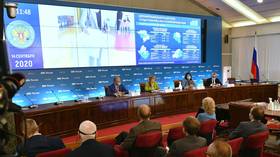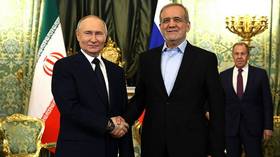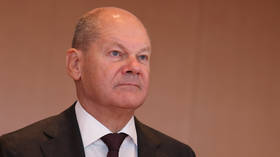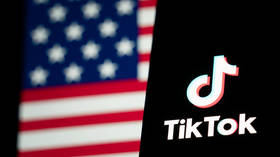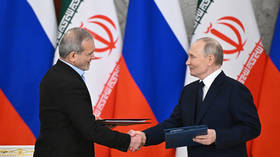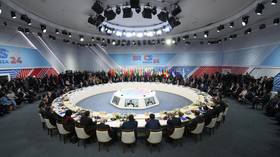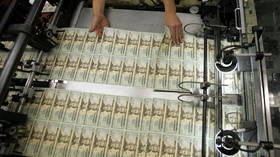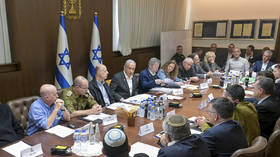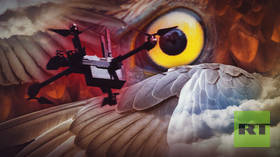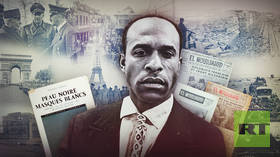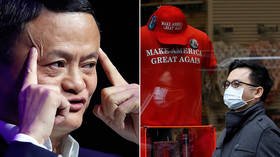Despite small gains for the far right & Navalny, Russia’s weekend elections don’t suggest any major political change is imminent
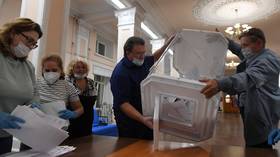
The status quo has it. That’s the message from the local elections that took place last weekend in a third of Russia’s regions. The United Russia party will be pleased with the outcome of what was a test of its grip on power.
The results will be less satisfactory for its opponents, because, despite frequent claims that Russians are growing weary of their rulers, in practice, they show little inclination for voting to change them.
The elections took place at a number of levels: by-elections for the State Duma (the national parliament), regional governors, regional parliaments, and city councils. United Russia won three of the four Duma by-elections, and most of the gubernatorial races. The latter were notable for the huge majorities won by incumbents, with most governors receiving 70 to 80 percent of the vote.
Also on rt.com Communists & Nationalists poised to make gains in Russian regional elections, but Western-leaning liberals unlikely to prosperResults in votes for local legislative bodies were more mixed. For the most part, United Russia came out 30 percent or more ahead of its main opponents, the Communists and Vladimir Zhirinovsky’s nationalist Liberal Democratic Party of Russia (LDPR), who competed in most regions for second place. In short, the elections pretty much reproduced the results of the last national vote, suggesting that the political system is quite stable, and we should not expect any great shocks in the immediate future. The powers-that-be will be able to look at the outcome with some satisfaction.
Given the stability at the top, attention has inevitably drifted towards the bottom, in an effort to find something newsworthy. This has meant focusing on the plethora of small parties that competed in this weekend’s local elections. These included some long-standing also-rans, such as the Yabloko (‘Apple’) and Rodina (‘Motherland’) parties, as well as some new ones competing for the first time, such as novelist Zakhar Prilepin’s For Truth, and New People, a center-right liberal party catering to urban professionals.
The Western media has largely ignored most of these groups, concentrating instead on the campaign of opposition activist Alexei Navalny and his supporters. This campaign took two forms: first, a tactical voting scheme called ‘smart voting’, which encouraged Russians to vote for whichever candidate was mostly likely to defeat United Russia; and, second, direct participation in the elections.
The impact of smart voting is hard to determine. It influences only that relatively small part of the population that regards defeating United Russia as the number-one objective. And it only makes a difference in situations where electoral races are already very tight. In other words, if it has an effect, it is on the margins.
The main focus of the Navalny campaign was the Siberian city of Novosibirsk. There, United Russia won 44 percent of the vote, but with 23 seats fell just short of a majority on the 50-seat city council. However, three deputies elected as independents have joined the party faction in the assembly, thereby giving it a total of 26 and a one-seat margin of control.
It is not impossible that tactical voting inspired by smart voting tipped the balance in a couple of seats, and thus made a difference. But it is almost impossible to tell whether that is so. At the same time, however, smart voting did not prevent United Russia from winning by far the largest number of votes in Novosibirsk, nor did it stop the party from gaining majorities in most other cities and regions on Sunday. Thus, while Navalny’s supporters, and his Western fans, are calling smart voting a success, the Russian press is for the most part labeling it a failure.
Members of Navalny’s team did win seven council seats over the weekend – two in Tomsk and five in Novosibirsk. But while they will no doubt take pleasure in these victories, seven municipal council seats hardly makes them a national political force.
Other minor groupings did better. Particularly successful was the New People party, which won 15 percent of the poll in Tomsk as well as seats on all of the four regional councils it contested. If it can increase its organizational capacity so as to put up candidates throughout the country, it might have some chance of winning a few seats in the State Duma. It seems a more likely candidate for a successful liberal party than Navalny’s organization.
Also on rt.com Big country, big vote: Russians choose governors & local councils in THOUSANDS of elections held on single dayThe nationalist fringe also had some successes on Sunday. Prilepin’s For Truth won 7 percent of the vote and two seats in the Ryazan region. Even more strikingly, the Rodina party swept to power in Tambov, 500km southeast of Moscow, gaining 44 percent of the vote and a majority of seats on the city council. For Truth and Rodina might both be called ‘ultra-nationalist’ parties, Prilepin having fought for the rebels in Eastern Ukraine, and Rodina being sometimes referred to as ‘far right’.
This may explain why their victories have yet to receive any attention from the Western press, despite the fact that Rodina captured control of a whole town, not just a handful of city deputies. For now, the nationalist right presents a more significant electoral threat to Russia’s main parties than the liberals.
Neither, though, is in a position to mount a significant challenge for power. Russia’s opposition is deeply fragmented. Occasionally, it’s able to win a local victory, but it’s a different group in each locality, and none can repeat the success at a higher level. Judging from the local election results, the three main parties – United Russia, the Communists, and LDPR – will continue to dominate for some time to come, with United Russia remaining far ahead of the others. Change may come, but there is nothing in Sunday’s results to suggest that it is imminent.
If you like this story, share it with a friend!
The statements, views and opinions expressed in this column are solely those of the author and do not necessarily represent those of RT.
The statements, views and opinions expressed in this column are solely those of the author and do not necessarily represent those of RT.
